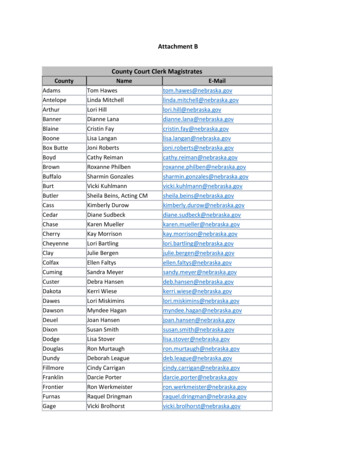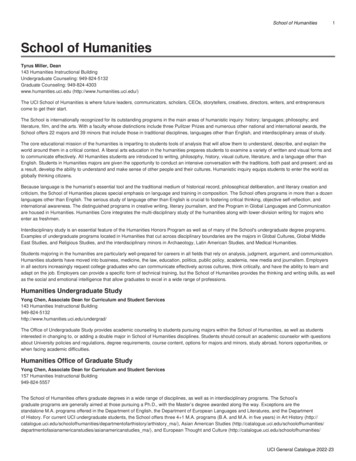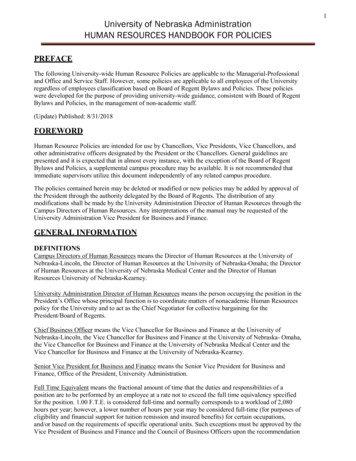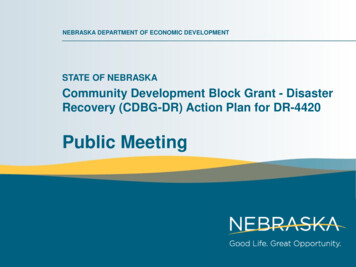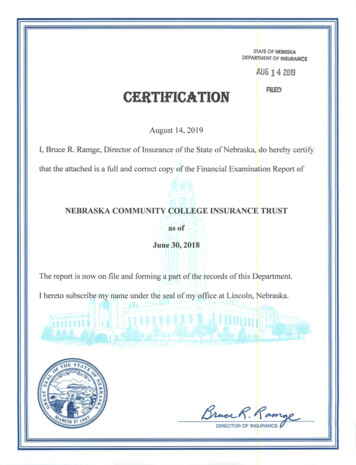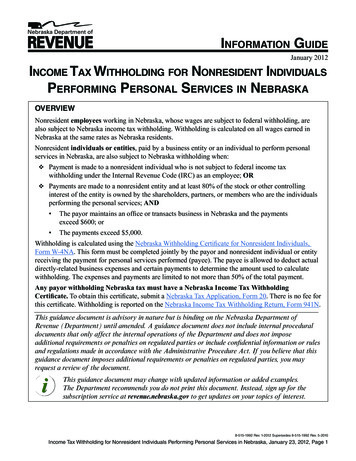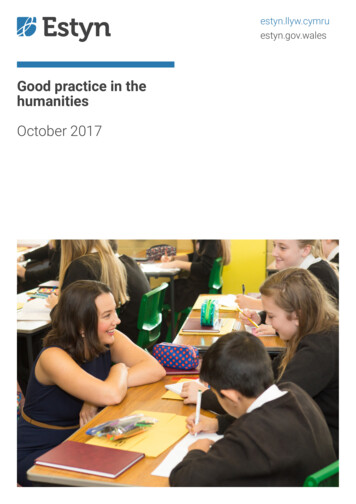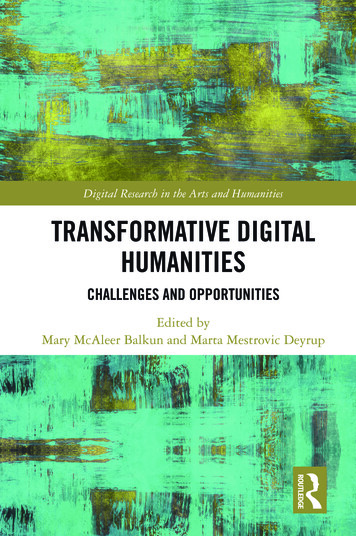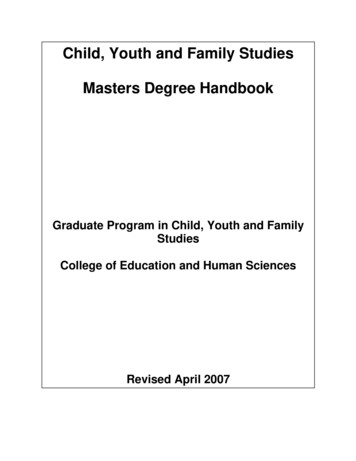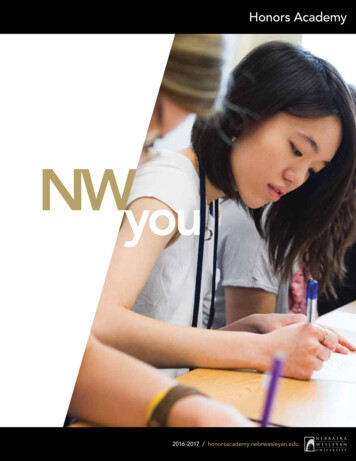
Transcription
J U LY28 — 30McCook, Neb. 2022
The 1950s are often looked at with a sense of nostalgia andromanticism. However, this decade was also a time of sweepingchange that can now be revisited with a critical, more objective eye.This weekend’s Nebraska Chautauqua will explore various social,economic, international, and political changes during the ‘50s. Multiplescholars from around the state and across the nation are gathering inMcCook to share their insight and lead discussions for an uniqueexperience that will be as fun as it is educational. Just as important are the personalmemories attendees share with each other.The Nebraska Chautauqua is also an opportunity for the communityto come together to discuss these complex historical events andexplore how the 1950s still connect with current events. Asyou enjoy the events, presentations, discussions, and theinteractive Q&A sessions, we hope you will draw your own7 p.m.Thurs. July 28MNBHot Summer Nights Concertfeaturing Jimmy D and theFabulous DestinationsThank you for joining us. It is time to put “the Fifties in Focus.”at Norris Parkconnections from the 1950s to today.
Friday July 29 20223 - 4 p.m.1950s Tea Party Museum of the High Plains (413 Norris Ave)5 - 7 p.m.Food Trucks (West D Street)5 p.m.“A Century of Fashion: The 1950s” with Sue McLain, Fox Theatre (412 Norris Ave)6 - 8:30 p.m.1950s Car Exhibit (West D Street)7 p.m.Keynote: “The Middle Way: Eisenhower and the Struggle for National Consensus,” by Jim Newton,Fox Theatre, with Q & A moderated by Dr. Catherine Biba, Hastings College8 - 10 p.m.Reception at Keystone Business Center/Norris Alley, with “For Dancers Only” presentationand sock hop, (402 Norris Ave, ‘50s attire welcome!)Saturday July 30, 20229 - 11 a.m.Norris Avenue Walking Tour Meet at Museum of the High Plains9 a.m. - NoonDiscovery Center Kids’ Activities (West D Street)9 a.m. - 1 p.m.Farmers Market/Flea Market (West D Street)9 a.m. - 5:30 p.m.Rock Around the Clock Breakout Sessions (Museum of the High Plains & Keystone Business Center)(See following pages for specific times, descriptions and speaker information.)11 a.m. - 1 p.m.and 5 - 7 p.m.Food Trucks (West D Street)6:30 p.m.Rosa Parks, as portrayed by Becky Stone, Fox Theatre7:30 p.m.Thurgood Marshall, as portrayed by Dr. Lenneal Henderson, Fox Theatre8:15 p.m.Q&A with Chautauqua Scholars and closing remarks, Fox Theatre8:30 p.m.Chautuaqua Celebration (Keystone Business Center)1
Rock Around the Clock Breakout SessionsTwo sessions are scheduled for each timeslot except at 10:05 and 11:10 a.m.9 a.m.Museum ofThe Korean War: Bewilderment in theNew Cold War Dr. Thomas Berg, HN Speakers Bureauthe High Plains After victories in two world wars, Americans expecteda similar victory in Korea. However, with no comprehensive defense plan, inadequate forces, few allies withmilitary power, changing political objectives, a differenthomefront mentality, and a fight between Pres. HarryTruman and Gen. Douglas MacArthur, we were woefully disappointed with the war’s outcome. Less thanfive years after the end of the most horrific war in worldhistory, the roiling Cold War could become even worse.What’s Up with Ward & June? The ‘50sAmerican Family in Myth, Memory,KeystoneBusiness Center & Reality Dr. Catherine Biba, Hastings College9 a.m.Training Room(3rd Floor)One of the enduring images of 1950s in theUnited States is that of the nuclear family. Indeed,there is much truth to the idea that the 1950s werean intensely family-focused time period. Explorethe reasons for this family-centered culturalmoment and the limitations and realities of familylife in 1950s America.10:05 a.m. Fire in the Hole: The Contrasting Visionsof Dwight Eisenhower and Earl WarrenMuseum ofthe High Plains Jim Newton, Eisenhower and Warren ScholarDwight Eisenhower and Earl Warren were amongthe most prominent Republicans of their day. Theyshared many views on matters foreign anddomestic. Eisenhower appointed Warren to the Supreme Court, yet they came to regard each otherwarily, even with suspicion. What happened, andwhat were the implications for the country? Join inon a discussion about this tenuous relationship.2
Rock Around the Clock Breakout SessionsTwo sessions are scheduled for each timeslot except at 10:05 and 11:10 a.m.The Fight for Civil Rights11:10 a.m.Dr. Lenneal Henderson and Becky StoneJoin our Chautauqua scholars in exploring significant developments in the Civil Rights movementin the 1950s and how the different events are tiedto issues of politics, faith, and mass media. Theywill focus on how some of the major players in theCivil Rights movement at that time (including RosaParks and Thurgood Marshall) found their wayinto turning points in history. Extra time allotted forthis segment to allow for questions and answersfollowing the presentation.Museum ofthe High PlainsLunch12:25 p.m.(75 minutes)Food available for purchase from food trucks on West D Streetas well as local restaurants.Crises and Opportunities ofthe1950s Cold War1:15 p.m.Museum ofDr. Thomas Berg, Humanities Nebraska Speakers Bureauthe High PlainsThe tension in the post-World War II decadebetween the United States and the Soviet Unionbecame the new normal that impacted the wholeworld. What were some of the flashpoints in theCold War in the 1950s, and how did the superpowers and their allies maintain the general peaceand resolve some of the tension without entering anew “hot war”?3
Rock Around the Clock Breakout SessionsTwo sessions are scheduled for each timeslot.1:15 p.m.Red Channels: Anti-Communism in1950s Film and TelevisionKeystoneBusiness Center Dr. Sean Trundle, University of Nebraska-LincolnTraining RoomThe Second Red Scare famously reached its(3rd Floor)zenith with the Army-McCarthy hearings in 1954,broadcast directly into American living rooms.These hearings put McCarthy’s overzealous andoften paranoid efforts to root Communists out ofthe federal government on full display, effectivelyending his moment in the political spotlight. Butthis was hardly the first — or the last — time thatanticommunism would grace either the ‘idiot box’or the silver screen over the course of the decade.2:20 p.m.Museum ofLet’s Play Ball! Sports in American LifeDr. Catherine Biba, Hastings Collegethe High Plains Playing and watching athletic competitions havebeen popular in the United States for a long time,but the 1950s marked an important decade forthe growing importance of sports in Americans’recreational life. Professional leagues expanded,colleges began concerted efforts to grow footballprograms into well-attended spectacles, and TVprovided a new opportunity to enlarge fanbases.Sports now consume many American leisure hours.2:20 p.m.History of Rock N’ RollKeystoneBusiness CenterTraining Room(3rd Floor)Dr. Randall Snyder, Humanities Nebraska Speakers BureauWhat would the 50s have been without rock &roll? This presentation takes a look at rock music’sinteraction with social history, with topics rangingfrom the origins of rock to Elvis Presley.4
Rock Around the Clock Breakout SessionsTwo sessions are scheduled for each timeslot.SAC, Deterrence, and Nebraskain the Early Cold War3:25 p.m.Museum ofthe High PlainsDr. Karen Miller, Command Historian of U.S. Strategic Command,Offut Air Force Base, NebraskaNebraska was far away from many crisis points earlyin the Cold War, but with the establishment ofStrategic Air Command at Offutt Air Force Base,Nebraska played a central role in world crises in the1950s and beyond. Explore the role of the SACand Offutt Air Force Base in the containment anddeterrence during this tumultuous time.A Lost Consensus? Politics and Culturein the 1950s Dr. Thomas Berg, HN Speakers Bureau3:25 p.m.Post-War Pop: Memorabilia of the ‘50s4:30 p.m.Donald-Brian Johnson, Humanities Nebraska Speakers BureauMuseum ofAmerica has been flooded with pop culturethe High Plainscollectibles for the better part of a century, butperhaps none are as iconic as those that recall the1950s. Johnson’s entertaining, informative programexamines how the trends of this fabulous decadecame to be. A colorful PowerPoint presentationand artifact samples bring the mid-twentieth centuryvibrancy to life. Enjoy an invigorating explorationof the tastes that shaped an era.KeystoneBusiness CenterAfter World War II, America’s thinly-restraineddomestic and political unity fractured into business Training Room(3rd Floor)as usual. After suffering privations during the GreatDepression and WWII, Americans wanted new andbetter “everything:” consumer goods, housing, jobs,education, government services, and more. How toimprove the nation’s standard of living while dealingwith the Soviet Union was anyone’s guess.5
Rock Around the Clock Breakout SessionsTwo sessions are scheduled for each timeslot.4:30 p.m.KeystoneConformity and Its Discontents:Suburbanization & Consumer CultureBusiness Center Dr. Sean Trundle, University of Nebraska-LincolnTraining Room Though suburban development undeniably raised theliving standards for millions of Americans, the bland(3rd Floor)uniformity of tract housing and visible status symbolsof mass consumption also led to a hyperawareness ofeven small social or economic differences. This realitybred fears that cookie-cutter neighborhoods wouldlead to an eradication of individualism, replacingthe free ‘American spirit’ with ‘The Organization Man.’Please share your opinion!Your feedback will help HumanitiesNebraska create more programs like“The Fifties in Focus” in the future.Please visitt inyurl.com/50sFeedbac kor scan the QR code belowto provide your thoughts.Thankyou!6
About the Keynote SpeakerJim NewtonJim Newton is a veteran journalist, author and teacher. In 25 yearsat the Los Angeles Times, Newton worked as a reporter, editor,bureau chief, columnist and, from 2007 through 2010, editor ofthe editorial pages. He is the recipient of numerous national andlocal awards in journalism and participated in two staff efforts,coverage of the 1992 riots and the 1994 Northridge Earthquake,that were awarded the Pulitzer Prize. He is now a lecturer of publicpolicy at UCLA and is editor-in-chief of BluePrint Magazine.Newton also is a respected author of four important works ofhistory, including “Eisenhower: The White House Years,” (Doubleday, 2011); and “Worthy Fights: A Memoir of Leadership in Warand Peace,” (Penguin Press, 2014), a collaboration with formerCIA Director and Secretary of Defense Leon Panetta.7
Meet the ChautauquansBecky StoneBecky Stone was born and raised in Philadelphia. She earned herundergraduate degree at Vassar College in Drama with a minorin French. Her M.A. is in Elementary Educational Counseling fromVillanova University. She worked for seven years for the Philadelphia School System and taught theater for 10 years at a classicalChristian school in Fletcher, NC.Becky has been a Chautauqua scholar since 2003 when she firstresearched and presented Pauli Murray. Her other characters areHarriet Tubman, Rosa Parks, and Maya Angelou. Becky continuesto act in theater. More often she is on stage as a storyteller atfestivals, libraries, and schools.Dr. Lenneal HendersonDr. Lenneal Henderson was born in New Orleans and raised in thehousing projects of San Francisco, California. He received his A.B.,M.A. and Ph.D. degrees from the University of California, Berkeley.Currently a professor at the Fielding Graduate University and visitinginstructor at the College of William and Mary among other keyroles in academia, Dr. Henderson has produced four books andmore than 60 articles and editorials for various publications. Heis an international lecturer/presenter, a Fulbright Senior Specialist,an actor, and the playwright of Thurgood is Coming, a one-manplay commemorating the 50th anniversary of Brown v. the Board ofEducation, in which he performed the role of Thurgood Marshall.8
Meet the SpeakersDr. Catherine Biba is a Nebraska native, bornDr. Karen Miller is the Command Historian ofand raised in Geneva, Nebraska. She earned B.A.degrees in English and History from the University ofNebraska-Lincoln, and her M.A. and Ph.D. in Historyfrom Cornell University. Currently, she is an Assistant Professor of History at Hastings College where she teaches awide array of courses in U.S. History.U.S. Strategic Command, Offutt Air Force Base, Nebraska.She produces the USSTRATCOM official history, protectsand maintains its historical archive, material collectionand heritage program, provides historical perspective, andis responsible for the global command and control of U.S.strategic forces to meet decisive national security objectives.Dr. Thomas Berg received his M.A. and Ph.D. inDr. Randall Snyder is a composer and jazzUS military history from the University of Nebraska-Lincoln.He has taught courses in American history, Europeanmilitary history, US military history, and the Second WorldWar. Dr. Berg has received a high number of teachingawards at UNL and is one of the most popular instructorsfor the Osher Lifelong Learning Institute.musician who lives in Lincoln and teaches at Peru StateCollege. Born in Chicago, he studied saxophone with hisfather, a professional jazz musician. He earned his Ph.D.degree from the University of Wisconsin in 1973. Whilesimultaneously publishing original compositions, Snyderteaches courses in jazz, ethnomusicology and rock and roll.Donald-Brian Johnson is the co-author ofDr. Sean Trundle is an Associate Professor ofseveral books on Art Deco through Mid-Century decorativearts. Prior to his career as an author, he worked in theMidwest as an award-winning theatre director, television/radio reporter, and advertising writer. Johnson has earned anational reputation as a seminar speaker and contributingwriter for numerous design publications.Practice in the Department of History at the University ofNebraska-Lincoln. His primary research interests centeron postwar popular culture, science and technology, anddigital pedagogy. He received his Ph.D. from theUniversity of Hawaii at Manoa in 2013.9
About Humanities NebraskaHumanities Nebraska is a statewide non-profit organization supported by the NationalEndowment for the Humanities, the Nebraska Cultural Endowment, the State of Nebraska, andmany generous donors throughout the state.For nearly 50 years, HN has helped Nebraskans explore what connects us and makes ushuman. HN programming offers engaging experiences for residents of all ages to explore otherworlds of expression and human existence, celebrate shared histories and diverse cultures,and engage in meaningful conversation that respects difference and finds points of commonexperience. These opportunities include: Grants to non-profit organizations for public programsSpeakers Bureau available to communities throughout the stateReading and discussion programsHistory events and traveling exhibitsHN programs enrich Nebraskans and cultivate a more informed, thoughtful, and just societythrough reading, learning, thinking, questioning, and discussing.For more information, please visit HumanitiesNebraska.org.Humanities Nebraskafunds programs in communities across the state each year,thanks to generous contributions from citizens like you. Pleaseconsider joining them in supporting HN’s many programs thathelp Nebraskans explore what connects us and makes us human.To make a gift that will support HN programming, please visitour website, www.HumanitiesNebraska.org, or pick up anenvelope at our Chautauqua information table.10The Nebraska Cultural Endowmentis pleased to be a partner with Humanities Nebraska and the NebraskaArts Council in ensuring a lasting legacy of arts and humanitiesprograms for all Nebraskans. Congratulations to HN for its 2022Chautauqua season and best wishes to volunteers in McCook formaking it possible. To become a partner in Nebraska’s cultural future,contact Maggie Smith, executive director of NCE at 402-595-2722 orby sending email to info@nebraskaculturalendowment.org.
Humanities Nebraska ProgrammingCapitol Forum on America’s FutureUsing a curriculum from Brown University, Capitol Forum encourages high school students to develop betterunderstanding of U.S. democratic principles as they discuss global issues with their peers and elected officials.ChautauquaChautauqua immerses audiences in exploring our history through educational entertainment for all ages inworkshops, evening presentations, and performances.Community ConversationsHumanities Nebraska supports community conversation programs that bring Nebraskans together to exploreimportant topics from different perspectives.Dear StrangerHN matches pairs of anonymous strangers to exchange thoughts, ideas and experiences via personal letters.Governor’s Lecture in the HumanitiesThe annual Governor’s Lecture brings an outstanding national speaker to Nebraska for a free public lectureon the humanities. A benefit reception preceding the lecture raises critical funding for statewide programs.GrantsHumanities Nebraska grants are available to non-profit organizations, government entities, and schools insupport of humanities-related programs that are accessible to the public.Museum on Main StreetCollaborating with the Smithsonian, Humanities Nebraska brings traveling exhibits to small Nebraska museums,building interest in exploring American history and culture. “Voices & Votes” will tour Nebraska in 2023.Prime Time Family ReadingUnderserved families gather to read and discuss award-winning children’s books with discussion leaders. PrimeTime fosters academic skills for children and encourages family literacy to help break the poverty cycle.Speakers BureauUrban and rural communities have easy access to more than 300 humanities programs by 150 speakers. Thisincludes a wide variety of topics, presented statewide each year at schools, libraries, and other venues.PartnershipsHumanities Nebraska collaborates with other organizations on a variety of programs across the state, includingNational History Day: Nebraska, Nebraska Literary Tour, Nebraska State Poet, Nebraska Warrior Writers, OneBook One Nebraska and others that enrich our appreciation for history, culture, and literature.11
History of ChautauquaTraveling Chautauquas in the late 19th and early 20th centuries brought the world to rural communities in Nebraska. Chautauquacombined programs of political oratory and lectures about health, science, and the humanities with entertainment, such as opera singersand stage performances of Shakespeare. Audiences heard about national issues and discussed their views with their neighbors. For manyrural Nebraskans, Chautauqua was the most important week of the year.On June 26, 1883, the first Chautauqua program in Nebraska opened in Crete. In 1884 the Crete Chautauqua Association acquired109 acres along the Blue River for two lecture halls, a dining hall, and 700 trees on site. Trains brought culture-hungry participants fromWymore, Lincoln, and Hastings. One delegation traveled all the way from Chadron to live in the tent city and hear the 10-day series ofinspirational lectures, lantern-slide illustrated travelogues, and musical concerts. One day in 1888, 16,000 people attended the CreteChautauqua, giving it the reputation of the greatest in the Missouri Valley.The success of the Crete Chautauquas encouraged businessmen in Beatrice to start a similar enterprise in 1889. Other Chautauquaprograms sprang up across the state. Tent cities blossomed for week-long periods at Chautauqua. Some people camped while hundredsdrove in, returning home to farm chores by night.At the turn of the 20th century, Chautauqua circuits were created. National Chautauqua promoters would roll into town, put up a bigcanvas tent, and overnight, towns would be transformed into bustling cultural centers. Tent cities still appeared, but the Chautauqua circuitsemphasized entertainment more than serious lectures or political debates.In 1907, Kearney had its first Chautauqua circuit. According to Edna Luce’s “Chautauqua,” the 1907 circuit brought campers to Kearneywho would “enjoy the week living the simple life mid the cool breezes and delightful shade of the park.” Locals gathered at Third WardCity Park to hear orators and such musical performances as the Williams’ Original Dixie Jubilee Singers.Chautauquas were so popular that it was not uncommon for Lexington’s Charles F. Horner, co-founder of the Redpath-Horner ChautauquaCircuit, to book more than 60 shows in one season. Chautauqua speakers included Teddy Roosevelt, Helen Keller, Mark Twain, ClarenceDarrow, Carrie Nation, George Norris, and perhaps the most famous Chautauquan, William Jennings Bryan, who presented his speech“Prince of Peace” more than 3,000 times.Several factors led to the decline of traveling Chautauquas: greater mobility, radio and film entertainment, economic decline, anda change in national attitude. Perhaps most significant was the radio, where news was quickly and directly broadcasted to the generalpublic, making it possible to hear FDR’s “fireside chats,” opera, and radio shows like “Amos and Andy” from the comfort of living rooms.Humanities Nebraska (HN) rekindled the tradition in 1984 with modern Chautauquas that use public forum and discussion to focus ona particular historical era or theme. For more than 35 years, HN has brought humanities-based Chautauqua programs to communitiesall across this great state. Humanities Nebraska is honored to continue its Chautauqua tradition by partnering with the community ofMcCook to present “The Fifties in Focus” in 2022.12
2022 Chautauqua Steering CommitteeLinda GraffSharleen RiemenschneiderLinda FrankKaren Kliment ThompsonBaleigh AbbottPeggy BeenCoordinating CommitteeCarol SchlegelJoann FalkenburgDonna KircherDenise GareySue DoakKelley LegottCal SiegfriedTricia WagnerLonnie WyenethMary DuelandRonda Graff
Please help us thank these generous contributors:The Johnny CarsonFund atVisit McCook/Red Willow County Visitors CommitteeMuseum of theHigh Plains/Carnegie LibraryFoxTheatreWagnerAuto GroupMcCook EconomicDevelopmentCorporationThe DiscoveryCenterMcCook Chamberof Commerce“For Dancers Only”StudioMcCook Arts CouncilMcCook Community Kitchen96.1 KICX/High Plains RadioCobblestone HotelSehnert’s/310 SocialRotary Club of McCookRed Willow County ExtensionCoyote Country 105.3 FMACME PrintingLoop Brewing CompanyCommunity Chest of McCookMcCook Public LibraryMcCook GazetteCoppermill SteakhouseMasonic TempleThanks also to the many generous donors and volunteers whose names were not availableat press time. Without your help, this wonderful event could not have happened.PRESENTED BY:HumanitiesNebraska.org
Friday July 29 2022 Saturday July 30, 2022 3 - 4 p.m. 5 - 7 p.m. 5 p.m. 6 - 8:30 p.m. 7 p.m. 8 - 10 p.m. 1950s Tea Party Museum of the High Plains (413 Norris Ave) Food Trucks (West D Street) "A Century of Fashion: The 1950s" with Sue McLain, Fox Theatre (412 Norris Ave) 1950s Car Exhibit (West D Street) Keynote: "The Middle Way: Eisenhower and the Struggle for National Consensus .
